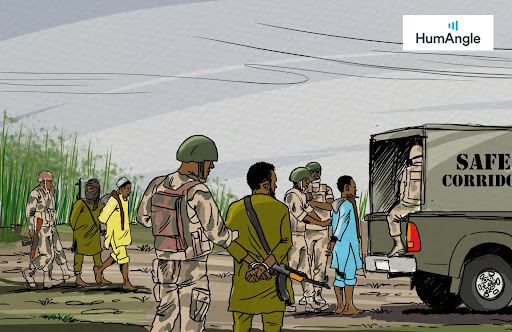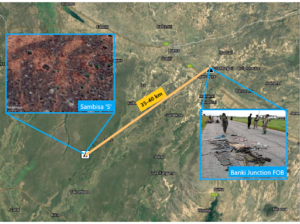Out Of Sambisa: Boko Haram Defectors Face Bumpy Road Ahead
The ‘disengagement’ process for persons associated with Boko Haram faces challenges linked to the size of resources needed and complexity around the defection.

The threat of relapse and resource shortfall is casting a shadow on the disengagement process for tens of thousands of defectors and civilians who fled the Sambisa forest area and turned themselves over to authorities in Northeast Nigeria.
According to a military briefing in early January, an estimated 24,059 persons surrendered to security forces. Since then, the military units in garrison towns such as Banki, Bama, Dikwa, Gwoza, and Gamboru have received hundreds more.
Although defectors are encouraged by the welcoming treatment from officials, insufficient care at the facility in Bama, southern Borno, is causing resentments and putting newcomers at risk, according to a number of the defectors.
HumAngle gathered that while the welfare conditions of defectors kept in Maiduguri have improved since they protested last November, those transferred to camps in Bama still face problems with feeding.
Already, dozens of deserters have relapsed and returned to the insurgent’s sanctuary after seeking safe passage and guarantee from counterparts who did not defect.
“Not all of the people who returned had it smooth,” one defector, however, disclosed to HumAngle. “One of my relatives was killed after he went back to the bush because they suspected he still had plans to desert. They noticed that he was selling some of the livestock he’d left behind.”
This situation also highlights the issues fueling the surrender to Nigerian authorities. Rather than reasons related to the desire for deradicalisation, the development has mainly been linked to the ex-militants’ unwillingness to submit to the rule of the Islamic State West Africa Province (ISWAP), which had overran the rival Boko Haram group’s Sambisa stronghold.
HumAngle has learned that some Boko Haram insurgents oppose the ISWAP rule through resistance activities around the Mandara Mountain range and Lake Chad.
The overwhelming needs and the absence of sufficient resources could impact the ability of the Borno State Government to manage the process of disassociation and rehabilitation effectively.
What’s behind the defections?
The disengagement is part of the aftershocks that accompanied the death of Boko Haram leader, Abubakar Shekau, following an advance into the Sambisa forest area by the breakaway ISWAP faction.
The split in 2016, as well as the onslaught in 2021, was related to doctrine and ideological issues, particularly the use of takfir (non-believer) designations and grievances against Shekau.
The Islamic State affiliate followed the dislodgement with a campaign to pacify and absorb rival insurgents and territories, which contributed to expanding its influence in the region.
The move led Boko Haram insurgents to choose the path of resistance. In contrast, civilian captives, including some of the Chibok girls and conscripts, flooded nearby garrison towns after navigating through the challenging terrain and hostile insurgents.

HumAngle reported that favourable treatment by military units was encouraging defections and movements away from the hinterland in and around Sambisa, located in the southwestern axis of Chad Basin National Park and close to the Mandara mountain.
Upon arriving at the outskirts of a garrison town usually ringed by the trench, they are received, processed, and kept at a holding facility by the military. At the same time, children are vaccinated with polio vaccines.
The central government’s short and long term approach towards security development and defections is still unclear. However, Borno state is currently leading the process.
Support Our Journalism
There are millions of ordinary people affected by conflict in Africa whose stories are missing in the mainstream media. HumAngle is determined to tell those challenging and under-reported stories, hoping that the people impacted by these conflicts will find the safety and security they deserve.
To ensure that we continue to provide public service coverage, we have a small favour to ask you. We want you to be part of our journalistic endeavour by contributing a token to us.
Your donation will further promote a robust, free, and independent media.
Donate HereStay Closer To The Stories That Matter




